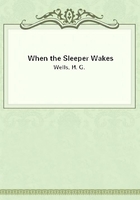
第60章
They emerged at first into a street whose opposite ways were crowded with the blue canvas liveries. This swarm Graham saw was a portion of a procession--it was odd to see a procession parading the city seated They carried banners of coarse red stuff with red letters. "No disarmament," said the banners, for the most part in crudely daubed letters and with variant spelling, and "Why should we disarm?" "No disarming.""No disarming." Banner after banner went by, a stream of banners flowing past, and at last at the end, the song of the revolt and a noisy band of strange instruments." They all ought to be at work,"said Asano. "They have had no food these two days, or they have stolen it."Presently Asano made a detour to avoid the congested crowd that gaped upon the occasional passage of dead bodies from hospital to a mortuary, the gleanings after death's harvest of the first revolt.
That night few people were sleeping, everyone was abroad. A vast excitement, perpetual crowds perpetually changing, surrounded Graham; his mind was confused and darkened by an incessant tumult, by the cries and enigmatical fragments of the social struggle that was as yet only beginning. Everywhere festoons and banners of black and strange decorations, intensified the quality of his popularity.
Everywhere he caught snatches of that crude thick dialect that served the illiterate class, the class, that is, beyond the reach of phonograph culture, in their common-place intercourse. Everywhere this trouble of disarmament was in the air, with a quality of immediate stress of which he had no inkling during his seclusion in the Wind-Vane quarter. He perceived that as soon as he returned he must discuss this with Ostrog, this and the greater issues of which it was the expression, in a far more conclusive way than he had so far done. Perpetually that night, even in the earlier hours of their wanderings about the city, the spirit of unrest and revolt swamped his attention, to the exclusion of countless strange things he might otherwise have observed.
This preoccupation made his impressions fragmeary.
Yet amidst so much that was strange and vivid, no subject, however personal and insistent, could exert undivided sway. There were spaces when the revolutionary movement passed clean out of his mind, was drawn aside like a curtain from before some startling new aspect of the time. Helen had swayed his mind to this intense earnestness of enquiry, but there came times when she, even, receded beyond his conscious thoughts. At one moment, for example, he found they were traversing the religious quarter, for the easy transit about the city afforded by the moving ways rendered sporadic churches and chapels no longer necessary--and his attention was vividly arrested by the facade of one of the Christian sects.
They were travelling seated on one of the swift upper ways, the place leapt upon them at a bend and advanced rapidly towards them. It was covered with inscriptions from top to base, in vivid white and blue, save where a vast and glaring kinematograph transparency presented a realistic New Testament scene, and where a vast festoon of black to show that the popular religion followed the popular politics, hung across the lettering Graham had already become familiar with the phonotype writing and these inscriptions arrested him, being to his sense for the most part almost incredible blasphemy. Among the less offensive were "Salvation on the First Floor and turn to the Right." "Put your Money on your Maker." "The Sharpest Conversion in London, Expert Operators! Look Slippy!""What Christ would say to the Sleeper;--Join the Up-to-date Saints!" "Be a Christian--without hindrance to your present Occupation." "All the Brightest Bishops on the Bench to-night and Prices as Usual.""Brisk Blessings for Busy Business Men."
"But this is appalling!" said Graham, as that deafening scream of mercantile piety towered above them.
"What is appalling?" asked his little officer, apparently seeking vainly for anything unusual in this shrieking enamel.
"__This!__ Surely the essence of religion is reverence.""Oh __that!__" Asano looked at Graham. "Does it shock you?" he said in the tone of one who makes a discovery. "I suppose it would, of course. I had forgotten. Nowadays the competition for attention is so keen. and people simply haven't the leisure to attend to their souls, you know, as they used to do." He smiled.
"In the old days you had quiet Sabbaths and the countryside. Though somewhere I've read of Sunday afternoons that--""But, __that__," said Graham, glancing back at the receding blue and white. "That is surely not the only--""There are hundreds of different ways. But, of course, if a sect doesn't tell it doesn't pay. Worship has moved with the times. There are high class sects with quieter ways--costly incense and personal attentions and all that. These people are extremely popular and prosperous. They pay several dozen lions for those apartments to the Council--to you, I should say."Graham still felt a difficulty with the coinage, and this mention of a dozen lions brought him abruptly to that matter. In a moment the screaming temples and their swarming touts were forgotten in this new interest. A turn of a phrase suggested, and an answer confirmed the idea that gold and silver were both demonetised, that stamped gold which had begun its reign amidst the merchants of Phoenicia was at last dethroned. The change had been graduated but swift, brought about by an extension of the system of cheques that had even in his previous life already practically superseded gold in all the larger business transactions. The common traffic of the city, the common currency indeed of all the world, was conducted by means of the little brown, green and pink council cheques for small amounts, printed with a blank payee.